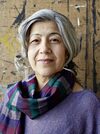Many people in Europe have little or no knowledge of Afghan art and culture. Little is known about the cultural landscape of the country before the Taliban took power again, before the military presence of the USA and NATO, but also before the Soviet invasion. The exile of many cultural workers in the last decades has led to differing views on this, even among Afghans in the diaspora.
Since the Soviet invasion of Afghanistan in 1979, many Afghans have also sought protection and asylum in Germany, and there are now several generations of cultural workers in the diaspora. What does "Afghan culture" mean to them, can we even speak of the "one" Afghan culture? How does the Afghan diaspora see itself and how is it perceived?
What ideas exist about Afghan culture? How can cultural workers draw attention to the situation in their country and at the same time be perceived not only as exiles or refugees, but as artists? In Germany, Afghan art is often seen as a homogenous construct and its actors are victimised. This panel aims to open up new perspectives on the myth of the homogeneity of the Afghan culture and art scene. Also to be discussed is the question of how art can break through the pure victim narrative of Afghan society.
Moderation:
 © Sajjad Sangar
Zainab Farahmand
© Sajjad Sangar
Zainab Farahmand is a freelance journalist from Afghanistan who works for various newspapers in Berlin as well as for Die Welt and Zenith Magazine. In Afghanistan, she wrote for Hasht e Subh Daily News. In 2016, she became a member of the Sahar Speaks International Female Journalists Network. In 2018, she was selected as one of the top 10 best journalists in Afghanistan for a report on a girl who wanted to become an actress. She received her bachelor's degree in Persian/Dari literature from Kabul University in 2015 and in political science from Gawharshad University, also in Kabul, in 2017.
Gäste:
 © Nazar Mohammadi
Mohsen Saifi
© Nazar Mohammadi
Mohsen Saifi studied classical guitar music at Kabul University. There he worked as a guitar teacher, orchestra director and programme manager. In addition to music guides for students and books on the function of the guitar in the music world, he published a work on the production of Afghan musical instruments. This was part of a cooperative music research between the University of Weimar and the University of Kabul. In Germany, he continues his musical activities and is a member of the research group on orchestral music in Afghanistan led by the University of Sheffield in England. He composed an orchestral piece based on a traditional Afghan song, which was performed by the Oxford Philharmonic Orchestra in June 2022.
 © Atelier Maqsoodi
Mahbuba Maqsoodi
© Atelier Maqsoodi
Mahbuba Maqsoodi is a visual artist who was born and raised in Afghanistan. Her father founded a school for girls in Herat, both parents were very liberal. But in traditional society, self-confident women were not welcome. When one of her seven sisters was shot by an Islamist terrorist, Mahbuba left the country. An art scholarship took her first to Russia for a few years and finally brought her to Germany, where she was granted political asylum and where she found a new home.
 © Stefano Spinelli
Siddiq Barmak
© Stefano Spinelli
Siddiq Barmak was born in Afghanistan in 1962 and received an MA in Film Studies from VGIK in Moscow in 1987. His feature film debut "Osama" (2003) was awarded at many renowned festivals such as Cannes, Busan and London and won Best Foreign Language Film at the Golden Globe Awards (2004). His second film "Opium War" (2008) was also awarded Best Film at numerous festivals (including Rome, Pristina).
Other activities in Barmak's career have included publishing the first film magazine in Afghanistan and teaching film at Kabul University. Barmak now lives in France and is working on his next film.
 © Astra Pentaxia
Shamayel Shalizi
© Astra Pentaxia
Shamayel Shalizi is an Afghan multimedia artist and founder of the jewellery and clothing label Blingistan, which is also active in community building and knowledge sharing. Shamayel Shalizi is involved in various grassroots organisations in Afghanistan and co-hosts the Diaspora Passing podcast, which aims to strengthen relationships within the global Afghan community. In November 2021, she published a poetry collection titled "Shut Up/ چپ باش/ Заткнись". She also uses painting, photography, videography and installations to explore themes of identity, trauma, imperialism, war, displacement and homeland.
Back